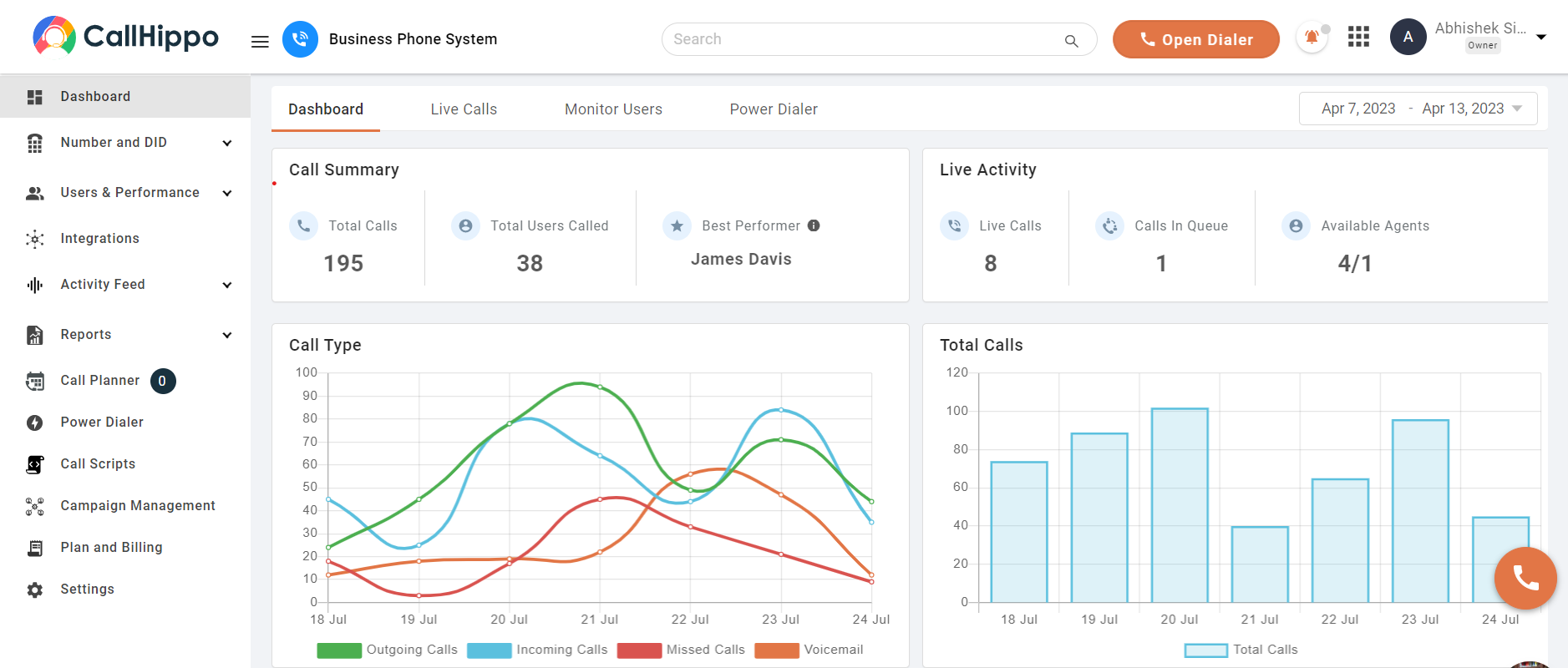With the continuous evolution of technologies across industries, it is necessary to keep up with the latest trends and updates. This applies equally to call center agents.
In this blog, we will discuss the term “call center coaching” and explore topics such as call center coaching techniques, call center coaching examples, and the top 10 tips for coaching call center agents. Lastly, we will highlight why CallHippo is the best call center coaching tool.
Let’s get started!
Regularly review and update coaching techniques to align with evolving customer expectations and industry standards. Encourage open communication channels for agents to share feedback and ideas. This will build a collaborative environment that improves agent performance and customer satisfaction in the call center.
What Does Call Center Coaching Mean?
Call center coaching is a call center activity that involves guiding and training agents to improve their performance and customer interactions. It focuses on using effective methods to improve skills like communication, problem-solving, and product knowledge.
Some of the notable call centers coaching techniques are role-playing scenarios, providing constructive feedback, and setting achievable goals. By coaching agents, call centers aim to increase customer satisfaction, reduce call handling times, and boost employee morale. You must note that it’s a continuous process.
Overall, call center coaching is an essential practice for maintaining high standards and delivering excellent service to customers.
10 Tips for Coaching Call Center Agents
Although call center coaching practices vary from one call center to another, there are a few rules that remain the same across industries. Let’s explore the top 10 call center coaching tips that will help you coach your agents more effectively.
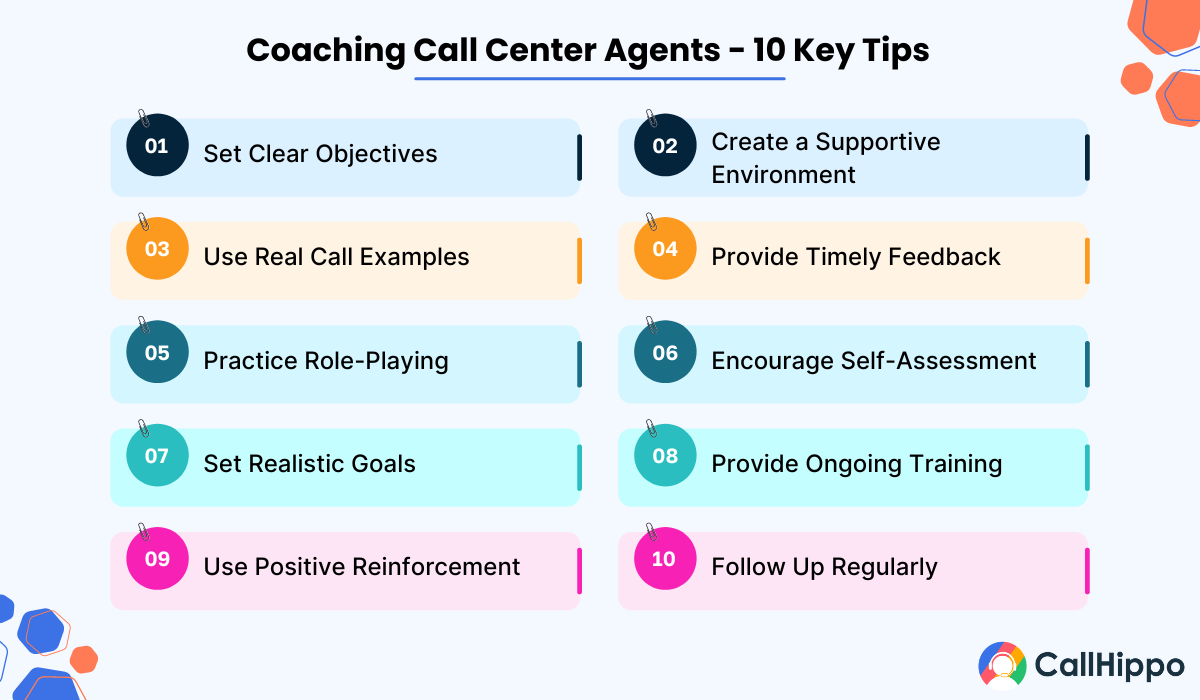
1. Set Clear Objectives
Begin each coaching session with specific goals. For example, focus on improving how agents handle customer complaints or enhance their ability to resolve issues efficiently. Clear objectives help agents understand what skills they need to develop.
2. Create a Supportive Environment
During coaching sessions, create a safe space where agents feel comfortable discussing challenges and receiving feedback. Encourage open communication to foster trust and collaboration.
3. Use Real Call Examples
Review actual call recordings during coaching. Highlight both successful interactions and areas for improvement. This practical approach helps agents visualize scenarios and understand how to apply new techniques.
4. Provide Timely Feedback
Give feedback promptly after coaching sessions and calls. Point out specific behaviors or skills that were effective and areas that need improvement. Timely feedback reinforces learning and helps agents adjust their approach quickly.
5. Practice Role-Playing
Conduct role-playing exercises where agents simulate customer interactions. Assign roles for agents to practice handling different scenarios, such as handling a frustrated customer or upselling a product. Role-playing builds confidence and prepares agents for real-life situations.
6. Encourage Self-Assessment
Prompt agents to evaluate their performance regularly. Ask them to identify strengths and areas where they can improve. Self-assessment encourages agents to take ownership of their development and helps them set personal goals.
7. Set Realistic Goals
Collaborate with agents to set achievable goals. Goals should be specific (e.g., reducing call handling time by 20%), measurable (e.g., improving customer satisfaction scores), attainable, relevant, and time-bound. Clear goals provide direction and motivation for improvement.
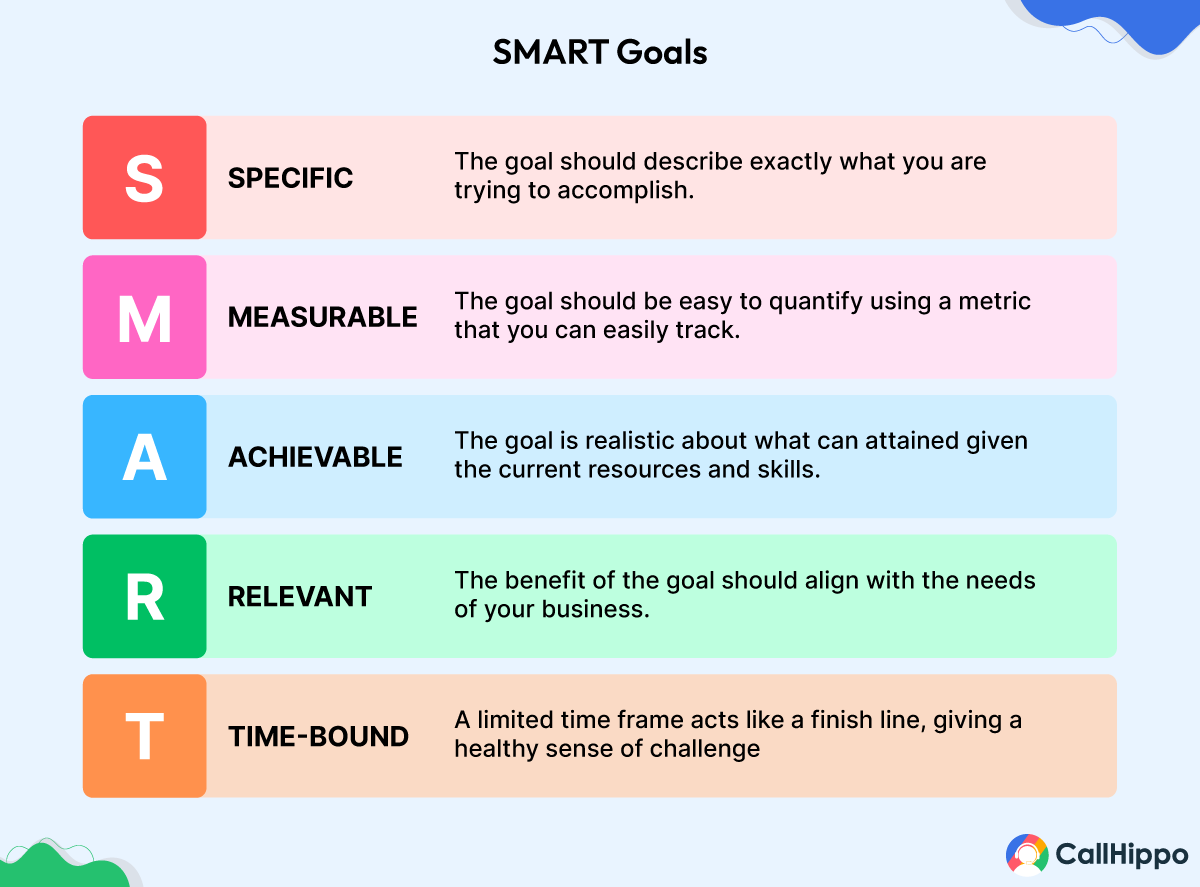
8. Provide Ongoing Training
Offer continuous learning opportunities beyond initial training. Keep agents updated on new products, services, and customer service techniques. Training sessions can cover topics like effective communication skills, handling objections, and using call center software efficiently.
9. Use Positive Reinforcement
Recognize and reward agents for their progress and achievements. Positive reinforcement can include verbal praise during coaching sessions, shout-outs in team meetings for exceptional performance, or rewards like certificates or small incentives. Celebrating successes motivates agents and reinforces desired behaviors.
10. Follow Up Regularly
Schedule regular follow-up sessions to monitor progress and provide ongoing support. Use follow-up meetings to discuss challenges agents are facing and brainstorm solutions together. Consistent follow-up ensures that coaching efforts lead to sustained improvement over time.
By following these call center coaching tips, you can certainly keep your agents motivated, improve customer satisfaction levels, and achieve higher performance standards.
Top 4 Call Center Coaching Techniques
Call center coaching techniques involve strategic methods to improve agents’ skills, boost their confidence, and ultimately improve customer satisfaction. Let’s check out the four major call center coaching techniques with examples.
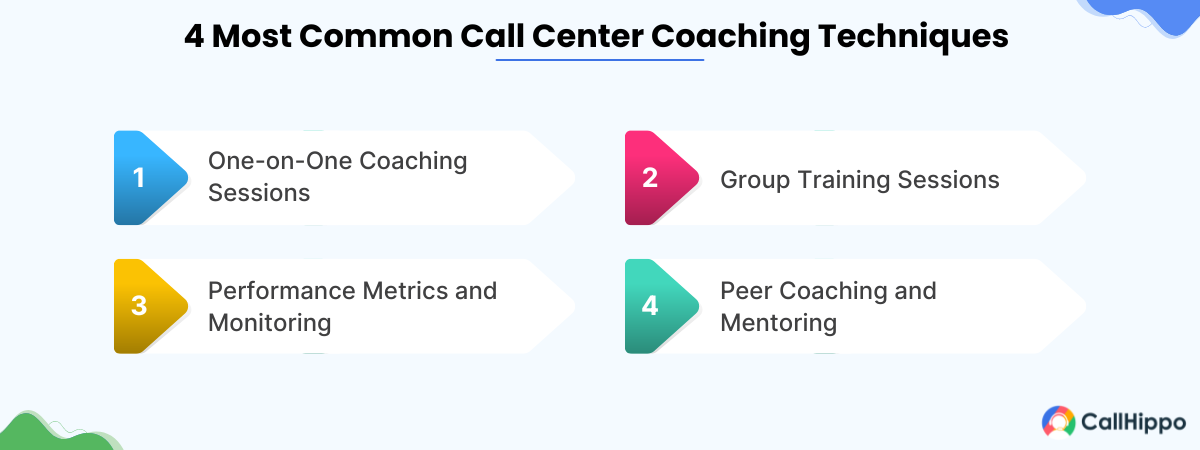
1. One-on-One Coaching Sessions
One-on-one coaching is an individualized approach where supervisors give personalized feedback and training. It involves:
- Reviewing recorded calls to provide specific feedback.
- Setting achievable goals and creating action plans.
- Encouraging open communication and addressing any concerns.
This technique is effective because it allows for tailored coaching, addressing each agent’s unique needs and challenges.
Let’s understand this with an example.
Suppose Sagar– a new call center agent struggling with handling irate customers. His supervisor– Rahul, schedules weekly one-on-one coaching sessions. During these sessions, Rahul reviews recorded calls with Sagar, highlighting both strengths and areas for improvement.
By focusing on Sagar’s individual needs, Rahul’s coaching helps Sagar become more confident and skilled in managing challenging customer interactions. This personalized approach ensures that Sagar receives the support he needs to improve and succeed in his role.
2. Group Training Sessions
The next notable call center coaching technique is group training sessions. As the name implies, this involves training multiple agents together in a group setting.
Group training sessions are ideal for teaching new skills, updating agents on changes in procedures, or introducing new tools and technologies. Group training sessions often include interactive elements like role-playing, group discussions, and hands-on practice. These activities help agents apply what they’ve learned in a supportive environment, making the training more engaging and effective.
Let’s take an example to understand this call center coaching technique better.
For example, consider a call center that has just implemented a new customer relationship management (CRM) system. The supervisor organizes group training sessions to ensure all agents understand how to use the new system.
During these sessions, the supervisor explains key features of the CRM, answers questions, and has agents practice using the system with sample customer interactions.
This type of group training approach ensures that all agents receive the same information and can help each other learn and adapt to the new system.
3. Performance Metrics and Monitoring
The third call center coaching technique on this list is Performance Metrics and Monitoring. This technique involves using data to track and assess agent performance.
Supervisors can set clear, measurable goals for agents, such as the number of calls handled, customer satisfaction scores, and the average time taken to resolve a call. By regularly reviewing these performance metrics, supervisors can identify patterns and trends that indicate how well agents are doing their jobs.
For example, suppose an agent consistently has a high average call handle time. In that case, the supervisor can look into why it takes longer for this agent to resolve issues and provide targeted coaching to improve efficiency.
On the other hand, if an agent receives high customer satisfaction scores, the supervisor can recognize and reward their good performance and possibly have them share their best practices with the team.
This data-driven approach ensures that feedback is specific and actionable, helping agents understand exactly what they need to improve and how to achieve their goals.
4. Peer Coaching and Mentoring
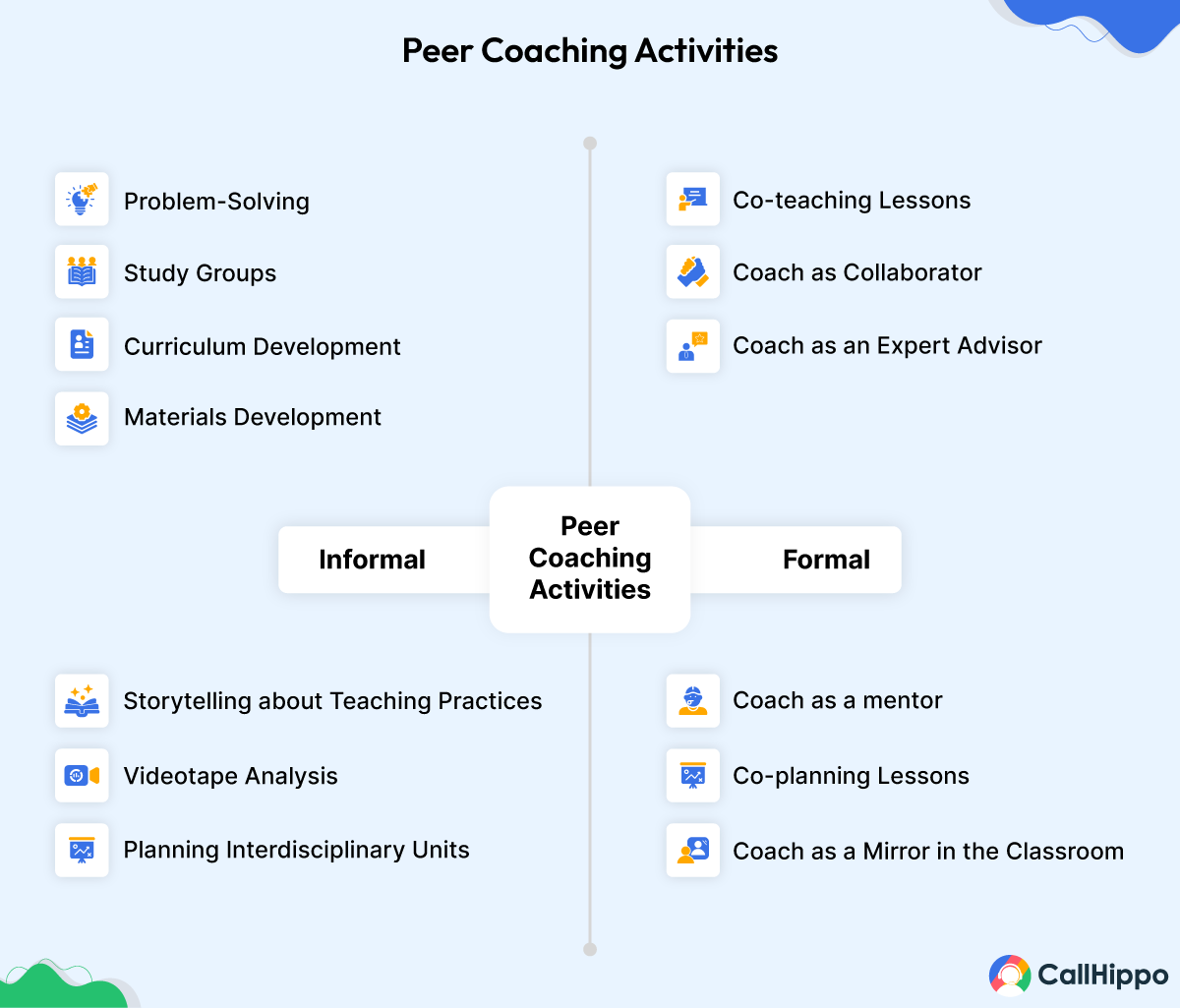
The fourth call center coaching technique is known as peer coaching and mentoring. This technique leverages the experience and knowledge of seasoned agents to train newer staff. This technique includes:
- Pairing new agents with experienced mentors.
- Encouraging peer feedback and support.
- Facilitating knowledge transfer through shadowing and collaborative learning.
For example, let’s consider Ram, an experienced call center agent who is paired with Mayank– a new hire. Ram acts as Mayank’s mentor, offering necessary guidance and support. They work together during shifts, with Ram providing real-time feedback and sharing tips based on his experience. Mayank quickly picks up best practices thanks to Ram’s mentorship.
By having a mentor like Ram, Mayank benefits from hands-on learning. This method helps new agents like Mayank adapt more quickly to their roles. All these factors make peer coaching and mentoring a valuable technique in call center coaching.
Integrating Techniques for Maximum Impact
It is suggested that, rather than choosing a single call center coaching technique, it’s better to use a mix of different call center coaching techniques.
For example, new agents can start with group training sessions to learn the basics. Then, they can be paired with experienced mentors for peer coaching. Supervisors can also hold regular one-on-one sessions to give personalized feedback and use performance metrics to track and improve progress.
This way, agents get well-rounded support and development.
3 Key Call Center Coaching Methods – Beginners vs. Tenured
Coaching call center agents is important for maintaining high-quality customer service. However, the approach to coaching can vary significantly depending on whether the agents are beginners or have been in the role for a longer time.
Here are the three call center coaching methods tailored for both beginners and tenured agents.
For Beginners:
In the case of beginners, structured training programs and script adherence are important in building foundational skills and confidence.
1. Structured Training Programs
| For Beginners | For Tenured Agents |
|---|---|
| Role-Playing Exercises: Practice different scenarios with immediate feedback. | |
| Shadowing Experienced Agents: Learn by observing experienced agents. | |
| Feedback Sessions: Regular feedback on strengths and areas for improvement. |
Call Center Coaching Method: Structured Training Program
Beginner agents often benefit from structured training programs that cover the basics of handling calls, understanding customer queries, and using call center tools effectively. These programs typically include:
- Role-Playing Exercises: Simulated customer interactions allow beginners to practice handling different scenarios they may encounter on calls. Coaches can provide immediate feedback on communication skills, problem-solving abilities, and adherence to call scripts.
- Shadowing Experienced Agents: New agents can learn by observing how experienced agents handle calls. This method helps them understand the practical application of company policies, handling difficult customers, and using call center systems efficiently.
- Feedback Sessions: Regular feedback sessions with coaches help beginners understand their strengths and areas needing improvement. Coaches can provide specific advice on tone of voice, active listening techniques, and ways to personalize customer interactions.
2. Script Adherence and Guidance
In the initial stages, beginners often rely heavily on call scripts provided by the company. These scripts serve as a foundational tool for new agents– guiding them through customer interactions step-by-step. Coaches focus on:
- Script Familiarization: Ensuring agents are comfortable with the scripts and can use them naturally without sounding robotic.
- Customization Skills: Teaching agents how to personalize calling scripts to suit individual customer needs while maintaining compliance with company guidelines.
- Handling Objections: Preparing agents to handle common objections by providing them with scripted responses and coaching on how to adapt these responses based on customer feedback.
| For Beginners | For Tenured Agents |
|---|---|
| Script Familiarization: Ensure comfort with scripts for natural delivery. | |
| Customization Skills: Personalize scripts while maintaining compliance. | |
| Handling Objections: Prepare scripted responses and adapt based on customer feedback. |
Call Center Coaching Method: Script Adherence And Guidance
3. Supportive Environment
Creating a supportive environment is absolutely vital for beginner agents as they start their journey in the call center. When agents feel supported, they are more likely to build confidence and improve their skills effectively:
- Encouragement: Coaches motivate beginners by acknowledging progress and celebrating achievements, no matter how small.
- Patience: Understanding that mistakes are part of the learning process and providing constructive criticism instead of criticism helps agents grow.
- Accessibility: Making coaches readily available for questions and guidance boosts agents’ confidence in handling calls independently.
For Tenured Agents:
In the case of tenured agents, advanced skill development and performance metrics focus on refining expertise and fostering career growth within the call center environment.
1. Advanced Skill Development
Tenured agents benefit significantly from coaching sessions that are designed to refine their current skills and help them develop more advanced capabilities:
- Advanced Role-Playing: Engaging in complex role-playing scenarios helps tenured agents practice handling escalated situations or specialized customer queries.
- Skill Enhancement Workshops: Participating in workshops that focus on advanced communication techniques, emotional intelligence in customer interactions, and effective problem-solving strategies.
- Peer-to-Peer Coaching: Encouraging experienced agents to mentor newer colleagues not only reinforces their own knowledge but also fosters a sense of leadership and responsibility.
2. Performance Metrics and Goal Setting
For agents who are already proficient in their roles, coaching shifts towards a more strategic approach that focuses on performance metrics and goal setting. Here’s how this process unfolds:
- Performance Analysis: Reviewing call metrics, customer feedback, and service quality scores to identify areas for improvement.
- Setting Challenging Goals: Collaborating with agents to set ambitious yet achievable goals for enhancing customer satisfaction, reducing call duration, or increasing first-call resolution rates.
- Continuous Improvement Plans: Developing personalized action plans that outline specific steps for agents to implement improvements based on performance reviews and coaching sessions.
3. Recognition and Career Development
| For Beginners | For Tenured Agents |
|---|---|
| Encouragement: Motivate by acknowledging progress and celebrating achievements. | |
| Patience: Provide constructive criticism and understand mistakes are part of learning. | |
| Accessibility: Make coaches available for questions and guidance. |
Call Center Coaching Method: Recognition And Career Development
Tenured agents who have been with the company for a longer period perform best in environments that appreciate their hard work and provide clear paths for career advancement:
- Recognition Programs: Acknowledging outstanding performance through awards, certificates, or public recognition boosts morale and motivates agents to maintain high standards.
- Career Path Discussions: Having regular discussions about career aspirations and providing guidance on advancement opportunities within the call center.
- Skills Diversification: Encouraging agents to participate in cross-training programs or take on additional responsibilities broadens their skill set and prepares them for future roles.
To sum up, call center coaching methods vary depending on whether agents are beginners or tenured. It is suggested that to achieve maximum results; organizations should tailor coaching approaches to the specific needs and experience levels of agents.
How Can CallHippo Help in Coaching Call Center Agents?
When you use CallHippo as your call center software, you don’t have to worry about coaching your call center agents. This is because, as a leading virtual phone system provider, CallHippo provides you with a range of AI-powered tools and features that help you perform this job so easily. Here’s how:
A. Real-time Coaching Insights
CallHippo’s AI Voicebot actively listens to customer interactions as they happen. By analyzing these conversations in real-time, the Voicebot can instantly provide feedback to agents. This feedback helps agents correct any mistakes immediately, leading to improved performance on the spot.
B. Talk-to-Listen Ratio
Supervisors can leverage features like Talk-to-Listen Ratio to monitor and enhance agent-customer interactions. The Talk-to-Listen Ratio helps in maintaining balanced communication dynamics, ensuring agents actively listen to customer concerns while effectively conveying information.
C. Sentiment Analysis
Understanding how callers feel during conversations is crucial for delivering exceptional customer service. CallHippo’s AI conducts sentiment analysis, gauging the caller’s emotions and reactions throughout the interaction. Armed with this insight, agents can tailor their responses accordingly.
D. Call Performance Rating
The Call Performance Rating feature of CallHippo assesses each call based on metrics like duration and customer satisfaction scores. This data-driven approach allows supervisors to identify trends, pinpoint areas for improvement, and implement targeted coaching strategies.
With CallHippo AI
- Talk-to-listen Ratio
- Sentiment Analysis
- Call Performance Score
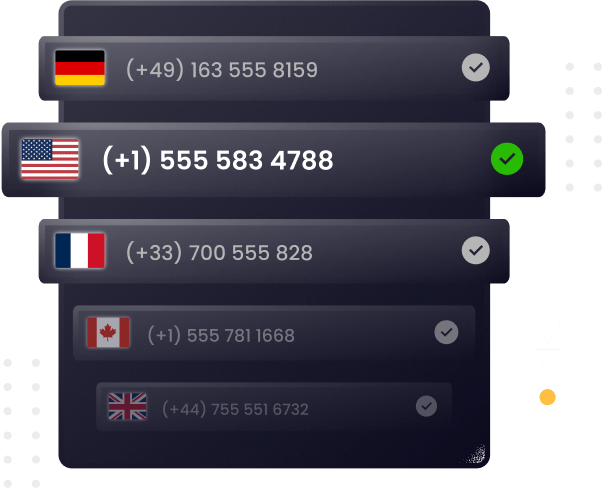
By leveraging all these AI-powered features and more, coaches can continually keep an eye on each interaction, take prompt steps, and guide agents to improve their performance in real-time, elevating customer satisfaction.
Conclusion
In conclusion, effective coaching is essential for maximizing the performance of call center agents. By focusing on communication skills, leveraging technology for real-time feedback, and nurturing key soft skills, supervisors can empower agents to excel. If you are looking for a call center solution that also helps you with call center agent coaching, consider CallHippo for its AI-powered features.
FAQs
1. What are the best qualifications for a call center role?
The best qualifications include strong communication skills, problem-solving abilities, customer service experience, and basic technical knowledge.
2. What are the four key soft skills known as the 4 C’s?
The 4 C’s are Communication, Collaboration, Critical Thinking, and Creativity, essential for effective teamwork and problem-solving.

Subscribe to our newsletter & never miss our latest news and promotions.

